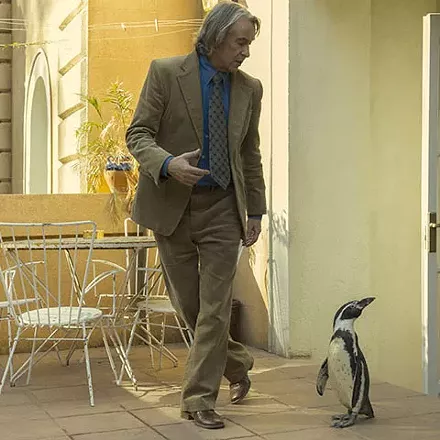EO
I'm not convinced that Jerzy Skolimkowski's film says anything particularly profound, either about human nature or about humans' interactions with nature, but it sure is a nifty piece of filmmaking. The narrative follows the episodic adventures/misadventures of a donkey called Eo, beginning with his life in a Polish traveling circus, then on to various other stops after the circus goes bankrupt and the animals are repossessed. A couple of the individual vignettes do provide a kick of energy, including a truck driver's experiences at a rest stop, a conflict involving soccer hooliganism, and Isabelle Huppert showing up as a wealthy widow to absolutely Isabelle-Huppert the hell out of the joint. Mostly, however, there are just fantastic moments of visual invention virtually everywhere you look—a drone flight over a forest bathed in red light; the tension-packed appearance of laser sights while Eo wanders alone; the strange appearance and just-as-abrupt disappearance of a robot dog; a visit to a dam where the waters clearly pour upwards—all highlighted by a terrific insinuating score by Pawel Mykietyn. It may or may not be Skolimkowski's deliberate spin on Bresson's Au Hasard Balthazar, and it may or may not inspire a uniquely compassionate perspective through its animal's-eye-view storytelling. With this much cool stuff to look at, none of that particularly matters. Available Jan. 6 at Broadway Centre Cinemas. (NR)
Corsage
The notion of a main character needing to be sympathetic is patently ridiculous; it's a bit different, however, when a filmmaker seems to want to make a main character sympathetic, but can't quite succeed. Writer/director Marie Kreutzer explores one year in the life of Austria-Hungary's empress Elisabeth (Vicky Krieps) from 1877-1878, as a woman once celebrated for her beauty faces down turning 40 and feeling her life increasingly without meaning. It's a bit of a bold gambit building a narrative around the existential crisis of someone so wealthy and powerful, and Krieps finds some layers in her performance to convey someone desperate to still be seen as desirable. But while Kreutzer makes some interesting efforts at capturing Elisabeth as a woman out of time—emphasized by her fascination with the brand-new motion picture technology, and the choice to have court musicians play anachronistic pop songs like The Rolling Stones' "As Tears Go By"—the episodic narrative rarely transcends portraying Elisabeth as impulsive and selfish, like when she refuses to allow her lady-in-waiting Marie (Katharina Lorenz) to get married, and subsequently forces Marie to become her public "body double." The ending's ahistorical suggestion about Elisabeth's ultimate fate feels like a last-ditch effort to make her seem like a particularly tragic figure, rather than simply the most powerful woman in a time when all women were to some extent tragic figures. Available Jan. 6 at Broadway Centre Cinemas. (NR)
The Old Way
I almost want to congratulate screenwriter Carl W. Lucas for the weird audacity behind this particular concept, even as I want to shake him for thinking he could actually pull it off. It's set in an unspecified year in an unspecified corner of the Old West, where once-feared gunslinger Colton Briggs (Nicolas Cage) has hung up his holsters for a homesteading life with his wife Ruth (Kerry Knuppe) and daughter Brooke (Ryan Kiera Armstrong). But his past catches up with him in the form of James McAllister (Noah Le Gros), a criminal on a quest to avenge Briggs' responsibility for the death of his father. The premise feels a lot like a cross between Unforgiven and John Wick, and it does play out somewhat that way, except that Lucas and director Brett Donowho throw a curveball: Brooke is clearly on what we would now call the autism spectrum, and Briggs probably as well. The Old Way walks an extremely precarious line as it juxtaposes the actions of Briggs and Brooke with those of McAllister, trying to find the place where a lack of conventional emotional reaction becomes pathological. And it feels more than slightly icky, even with some compelling performances along the way, most notably Le Gros capturing an icy villainy and Nick Searcy as the taciturn U.S. marshal hunting McAllister. Everything leads up to a fairly conventional guns-blazing finale, and some of the genre elements work just fine. But what exactly is it trying to say about neurodivergent people in this particular setting? I'm not convinced these filmmakers are skilled enough to say it without wading through a huge swamp of problematic. Available Jan. 6 in theaters. (R)
More by Scott Renshaw
-
Film Reviews: New Releases for March 28
A Working Man, The Woman in the Yard, The Penguin Lessons, Death of a Unicorn, Audrey's Children
- Mar 27, 2025
-
Film reviews: THE PENGUIN LESSONS, DEATH OF A UNICORN
Fumbling the potential-filled question of what to do when confronted with a broken system
- Mar 26, 2025
-
Theater preview: Plan-B Theatre Company's The Beatrix Potter Defense Society
Local playwright Janine Sobeck Knighton explores how isolation inspired the beloved author.
- Mar 26, 2025
- More »
Latest in Film Reviews
Readers also liked…
-
Sundance 2025 wrap-up plus February special screenings
Uncertainty about the future location shifts focus away from the movies
- Feb 5, 2025











